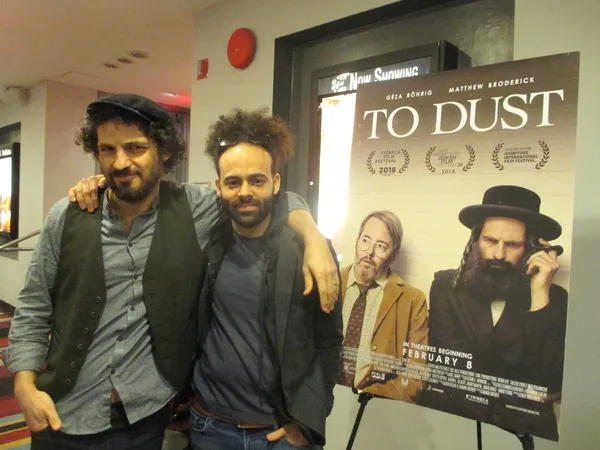 |
| Géza Röhrig stars opposite Matthew Broderick in Shawn Snyder's adventurous To Dust Photo: Anne-Katrin Titze |
Following a conversation on Sunset with László Nemes, the director of the Oscar-winning Son Of Saul, which starred Géza Röhrig, I headed down from the Film Society of Lincoln Center to the Village East Cinema for an opening weekend post-screening discussion with Géza, To Dust director Shawn Snyder and his co-screenwriter Jason Begue.
Before questions and comment from the audience, I started where I left off with László - TS Eliot's The Waste Land and what is in The Burial Of The Dead. A woman's voice sings a lullaby at the beginning of To Dust and Shmuel (Röhrig) closes the film with the same haunting song in the bedroom of his two boys, Noam and Naftali (Leo Heller and Sammy Voit) right before Tom Waits' Blow Wind Blow is heard over the end credits.
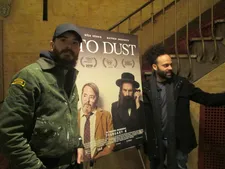 |
| Jason Begue with Shawn Snyder at the Village East Cinema Photo: Anne-Katrin Titze |
Right after the packed screening, I introduced the director, his writing partner and Géza to the audience and they received an enthusiastic round of applause. Shawn, Jason, and Géza shared their very personal feelings on fear, grief and awe, how humour helps "shine a light into darkness", and an explanation of why "the body holds on to the soul."
Anne-Katrin Titze: I just came from uptown with greetings for you, Géza, but also to everybody. I just met up with László Nemes, the director of Son of Saul, and he said he really wanted to be here but felt a bit under the weather so he sends his greetings. He was presenting his latest film Sunset [with a conversation at the Film Society of Lincoln Center] and we talked about The Waste Land by TS Eliot.
The first part of The Waste Land is The Burial Of The Dead and there's one line that says "I will show you fear in a handful of dust". What I noticed about your film is that there is no fear. It's such a fearless movie in so many ways, how you were putting it together, also the performances and the characters. Could you talk a bit about fear and fearlessness and confronting fear?
Shawn Snyder: That's a great question. I think that you have to be afraid in order to be brave, or else you're not brave to some extent. This film has very personal roots for me, some of the earliest seeds for it were when I lost my own mom, which was ten years ago last September. Confronting the realities, I have never felt comfort in her grave.
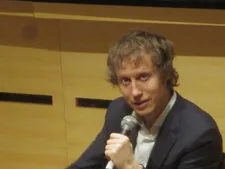 |
| Sunset and Son of Saul director László Nemes at the Film Society of Lincoln Center Film Comment Selects Talk with Nicolas Rapold Photo: Anne-Katrin Titze |
There's this constant sense of awareness of the decomposing biological entity that was once my mom. I've been to my mom's grave maybe five times in ten years and it always feels strange to be there. It's not where I feel her, I feel her in my life. There's also a Jewish timeline of grief and Jewish mourning and I think that Jewish mourning is very beautiful but my own grief was spinning outside the boundary of that.
And so I took those two things, these very haunting thoughts about my mom's body were grafted over the Jewish timeline for grief. You do shiva for seven days and what's my mom's body look like at seven days? Or at 30 days? And I repressed these thoughts. I think that we all do and don't think that we share that.
I think that they're pretty repressed individually and culturally. Because I don't think we have a very healthy relationship to death culturally. When you repress those things they sort of come back as nightmares and with a vengeance.
And I'm very squeamish personally and so there was this degree of facing fears and throwing the gauntlet down in terms of staring at this stuff honestly. And I think to do that with humour personally and as we try to do in this film is sort of important to get you through. Because the humour is humbling and it helps shine a light into darkness and we mean to be provocative and look at these things honestly in the film but not exploitatively.
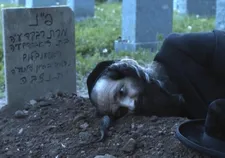 |
| Shmuel (Géza Röhrig) at his wife's grave in To Dust |
I found by facing those fears to some extent that if you want to look at these biological realities, that one, you should be allowed to and shouldn't feel ostracised for being macabre in that way. It might actually be healthy. And also that there is a spiritual beauty to that natural cycle despite all of its gruesomeness if you actually look at From Dust To Dust - that's poetry. But there's a biological mechanism through which that happens and there's beauty there. Were you guys scared?
Géza Röhrig: I agree with the assumption of the question, I assume is that fear is an enemy. I hate fear but in front of the sacred, what you have is awe, I guess, in English. When you're given a newborn baby or when you are in the presence of someone who just passed away, you instinctually know that you're not going to turn up the radio, you're not going to pick up the phone. You have awe. It's two different things. Fear is pooh-pooh, fear is bad, but there is something which is like fear to some degree - awe.
And that is sacred, just like life is. Our movie, hopefully, fearlessly, is trying to tackle this issue and in a very personal way. Which sooner or later we all go through. If you're lucky then the parents go first, not the spouse, or God forbid, the child. The film claims, I think, to mourn in a way that it's almost whatever works as long as you are not hurting somebody, everything is allowed. Because it's a matter of survival.
 |
| Shmuel (Géza Röhrig) with his sons Naftali (Sammy Voit) and Noam (Leo Heller) |
I always have a favourite line, because I keep seeing the movie because of Q&As, the line that somehow is echoing in my soul lately is "I just want her to be GONE!" Because it starts out so helpless: I don't know how to help the love of my life. But then it brings me down and I have two kids [played by Leo Heller and Sammy Voit] and it threatens me. There's a point where the emotions are taking him to another register.
AKT: Any thoughts?
Jason Begue: Oh my gosh, after so eloquently put there. Yeah, I've got fears. I fear death, for sure.
AKT: Still?
JB: Still. Even after this process. And I'm very squeamish, too. I don't like gore so it was interesting sort of doing this. For both of us, I think, like, you know, it was very important that we face these things upfront and there's something therapeutic about that. I'd like to say I live in awe but I guess I do live in fear of death.
GR: But isn't it strange that all those people who had a near-death experience, they all claim not to fear death anymore? You know, we think about it and it is of course awful but the people who sort of tasted it, they don't come back, saying it's the worst thing ever.
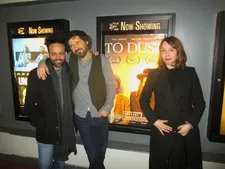 |
| Shawn Snyder and Géza Röhrig with Anne-Katrin Titze post post-screening discussion and Q&A Photo: Jason Begue |
AKT: I really like how the film is framed with the lullaby. It begins with the lullaby and it ends with you, Géza, singing the lullaby. And you told me a few days ago that this is something personal to you, a song your grandfather used to sing to you. What is it about?
GR: It's a rhyme. I'm not sure if even he knew what it was. I bet that this was sung for him as well. It was just generation by generation. The funny thing is that I was 12 years old when I met my grandfather. It was my adopted grandfather. And so you really don't sing a lullaby for a 12-year-old. It was for him to do this, sitting on my bed and singing, this was almost like we sort of wanted to make up for the years which we couldn't spend together for many reasons.
So this was a song that was in my ear when I met Shawn a good year before actually the shooting. I saw it in the script that there is a lullaby or there is a song. The movie starts with the mother humming it, singing it. And it ends with Shmuel finally finding his voice and coming back to the land of life, healed. And he is singing, after a year, I don't know. What is the time?
SS: Six to eight months. We had to be pretty specific.
GR: So I taped this on my iPhone and sent the song to Shawn and he said, "That's the song."
Later on in the discussion, Géza added the following explanation about Shmuel's preoccupation and the body and soul:
 |
| To Dust on the Village East Cinema marquee in New York Photo: Anne-Katrin Titze |
GR: Simplified, the idea goes something like this: It's not just that he has these nightmares and it's pretty clear for him that she is in discomfort. She's in pain, she's in discomfort. There's a little higher thing that goes with it, at least in my view.
I think the idea is that our body never forces us, let's say, to steal or to cheat on our wives or anything like that. We do that, not the body. So we violate the body in many ways when we do wrong. And I think the more we violate the body, the belief is that when we pass away, the body holds on to the soul. "Why did you do that to me? I'm a pure body. I'm the temple of the soul. And you used me for stealing, instead of giving charity. You used me for all the wrong reasons. Don't be so fast!" And the body holds on to the soul.
And so for her [Shmuel's wife Rivkah in the film] not to decay, or not to decay fast enough, gives this idea to Shmuel: "Was my wife a sinner? Did she have a second life? Did I know her well? What is going on?" So he is very desperate to figure it out, does this decay really go by the normal pace? Or there is something? Something here? Along these lines is the answer. The slower the decay, the more troublesome it is, I think, for Shmuel.
Read what Géza Röhrig had say on Matthew Broderick, Shawn Snyder, a lullaby his grandfather used to sing to him, and Ariel Marx, the composer of To Dust.
Read what Shawn Snyder had say on Matthew Broderick with Géza Röhrig, a shared humanity, production designer Alexandra Kaucher of To Dust, and Hitchcock's The Trouble With Harry.
To Dust is at the Village East Cinema in New York.





















